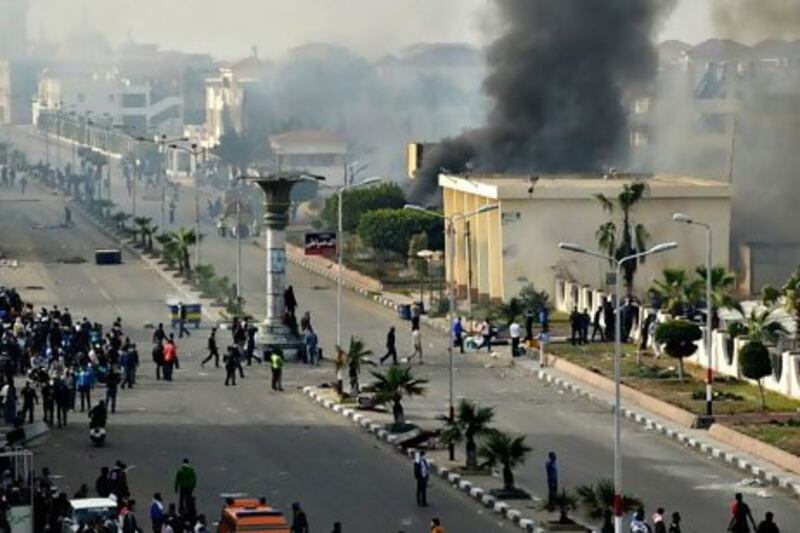CAIRO // At least three people were killed and more than 400 injured yesterday when rioting sparked by death sentences handed to supporters of a local football team rocked Port Said for the second straight day.
Hours before President Mohammed Morsi declared a state of emergency in three provinces hit by unrest, tens of thousands of mourners poured into the city for a mass funeral for many of the 37 people killed in rioting and clashes with police on Saturday. The bodies, wrapped in white shrouds, were carried in open coffins by a sea of mourners along the city's main avenue. Mourners chanted, "There is no God but Allah," and "Morsi is God's enemy".
During the procession, crowds attempted to storm three police stations and others torched a social club belonging to the armed forces, looting items inside, security officials said. There were reports from Egyptian newspapers and on social media of protesters and police both using live ammunition. The head of Port Said's hospitals, Abdelrahman Farag said among the dead was a teenager shot in the chest. Another 433 people were injured.
Helicopters hovered and troops moved in seeking to regain control of a city that has been wracked by violence after a court on Saturday sentenced 21 football fans to death for their role in a deadly stadium riot last year.
In addition to the clashes in Cairo, Alexandria and Suez that broke out Friday on the anniversary of the January 25th, 2011, uprising that toppled the regime of Hosni Mubarak, the breakdown in Port Said has escalated tensions in the country and raised questions about what options the government has left to calm anger in the streets.
Mr Morsi, elected in June, has not formally addressed the country since Thursday when he spoke on the birthday of the Prophet Mohammed about conspiracies by former members of the Mubarak regime to destabilise the country. He convened his National Defence Council for the first time during his presidency on Saturday, where the possibility of establishing a curfew in areas with the most fighting was raised but not decided upon.
The Muslim Brotherhood said in a statement on Saturday night that the situation was a "repugnant nightmare of dubious characters waging an almost full-scale war, seeking to turn hope into despair, and joy into terror, death and destruction, by inciting subversion and the use of violence and thuggery, attacking city halls and police stations, burning historical buildings and railway stations, blocking roads and subway lines, tunnels and bridges, and torching public and private facilities and offices".
The group also accused the private media of engaging in a "persistent campaign of deliberate vilifying and misinformation that has been charging people with hatred against the regime".
Pockets of Egypt were already seething with demonstrators angry with Mr Morsi's government on Friday. Many expressed disgust with Mr Morsi and his supporters in the Muslim Brotherhood, who they said were clamping down on freedoms and laying the groundwork to dominate all facets of power for years to come.
But when a Cairo court announced the death sentences for 21 of the 73 defendants in football riot case, Port Said erupted in fury. Family members of the convicted men, along with protesters and football fans known as Ultras, stormed the prison where the defendants were being held and other police facilities.
Port Said had already suffered from isolation after the football riot on February 1, 2012 that killed 74 people. In the days afterwards, nearby villages boycotted produce from the city and attacked cars bearing Port Said licence plates.
Many Egyptian commentators and several of the players and coaches at the game blamed the deadly riot on remnants of the Mubarak regime, who they accused to deliberately setting the scene for violence by locking doors, turning off the lights and not checking fans for weapons at entrances.
Witnesses last year described how fans descended onto the field just minutes after the game finished, wielding knives and bottle rockets. Many people died in stampedes at exit doors that were locked. Others were stabbed to death.
The court is expected to convene in March to announce any further convictions for the remaining 52 men.
bhope@thenational.ae
* With reporting from the Associated Press and Agence France-Presse
twitter: For breaking news from the Gulf, the Middle East and around the globe follow The National World. Follow us





